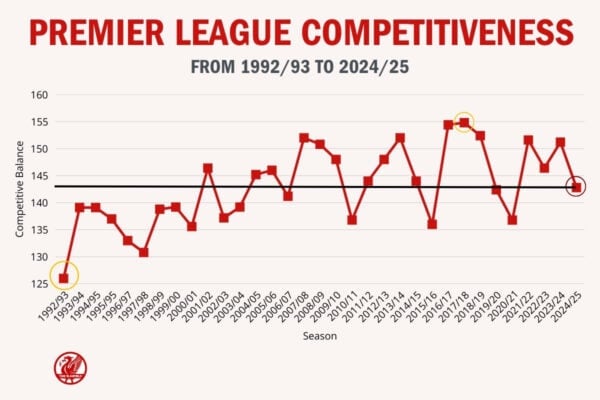Liverpool’s impending title triumph comes amid familiar shouts of it being a ‘weak’ Premier League, but the argument does not hold any substance.
The Premier League is widely advertised as the best in the world, with its competitiveness and underdog stories offering what other leagues cannot.
It is not to say there isn’t a level of predictability about it all, with only a handful of top clubs consistently competing for anything worthwhile as others fight for survival or to be the best of the rest.
But in 2024/25 we have seen mid-table clubs challenge for European places, displacing ‘top six’ regulars and disrupting the balance we have come to expect.
Liverpool’s title run, however, is being played out amid cries and complaints of this season being one of the weakest in Premier League history, but it is unfounded nonsense.
This is not a weak Premier League season

The Premier League has battled with vast inequality year on year, with Pep Guardiola’s Man City the leading culprit for which they are under investigation.
There have been only seven different title winners since the Premier League was formed in 1992/93, but we wanted to fact-check any suggestions of Slot’s side winning the competition at a weak point.
To calculate this we have to look at the competitive balance of the league, which in an ideal world sees each team have the same odds of winning – creating jeopardy, unpredictability and drama.
To analyse the league’s competitiveness since its formation, I have used the C5 index of competitive balance. A perfectly competitive league will take a value of 100, thus as the index rises the competitive balance decreases.
Calculations
The calculation first sees the total points won by the top five clubs in a particular season divided by the total points won by all clubs to provide a C5 ratio.
The final index is then calculated using the formula (C5 ratio/(5/N)) x 100, where N is the number of teams competing (which in the Premier League is 20).
The least competitive season on record is 2017/18, when City notched 100 points, with an index score of 154.85 – season 2016/17, when Chelsea won the league, is not far behind (154.4).
The most competitive remains the Premier League‘s first season in 1992/93 (126), which is indicative of how the influx of money into the league has significantly changed the landscape.
But as you can see in the graph below, the current season after 33 games is ranked as the 17th-most competitive campaign of 33 editions, with an index of 142.8.


Of the campaigns determined to be less competitive in the competition’s history, seven have been in the last decade going back to 2014/15 and 16 since the turn of the millennium.
It means this season is the 10th most competitive since 2000. So, please, spare us the ‘weak’ narrative.
Liverpool’s ability to beat their opponents is not a reflection on the state of the league, but rather the inability of others to be as consistent as Slot’s men.
The Reds will be deserved champions who could yet finish on 94 points, which would be more than 28 previous winners in a season which has proven unexpectedly competitive.










